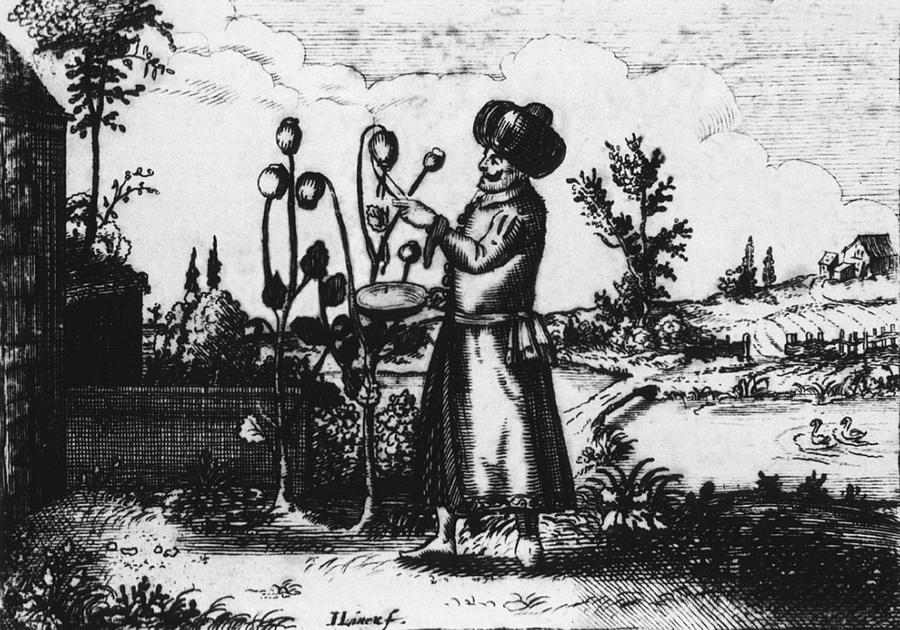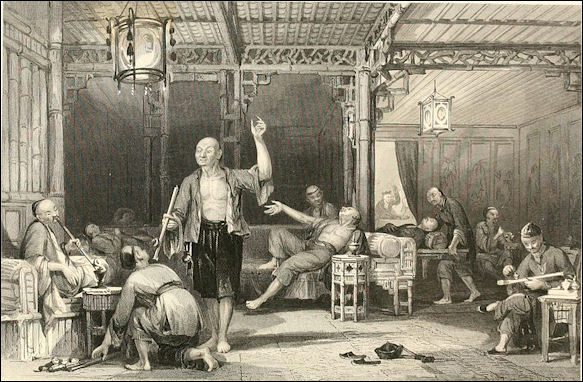Tuesday, April 5, 2016
D IS FOR DRUGGING
No one knows who first discovered that opium poppies had several valuable medicinal uses. But what we do know is that Sumerians in Mesopotamia were cultivating the plants about 5,500 years ago, and that cultivation continued throughout the Middle East for the next several millennia. The enterprising Phoenicians were the first to bring Egyptian opium on their long-distance trading voyages and to introduce it to Greece, Carthage and Europe. Much later, between 400 and 1200 A.D., Arab traders introduced opium to China. In 1527, the physician Paracelsus returned to the West from his travels through Arabia with "stones of immortality," derived from opium, hidden in the pommel of his sword, and as a professor at the University of Basel, he widely touted its use. Through experimentation, he found that opium was far more soluble in alcohol than in water, and he discovered a particular tincture of opium in brandy (to which he added crushed pearls, musk, and amber, among other things) which he found to be very useful in controlling pain. He named it laudanum, and it soon became a wildly popular component of all different kinds of medicines - for ailments from menstrual cramps to fretful babies - and remained in wide use (unnamed on product labels and unregulated by governments) throughout the West until the use of opioids first began to be regulated in the early 20th century.
But I'm getting centuries ahead of myself now. Back to the 1500's. Up to this point, opium appears to have been used by various cultures either in religious/spiritual rituals or as a surgical anesthetic. But the 16th century seems to represent the dawn of a new era. The practice of recreational drug use was born.
Poppy cultivation and opium-eating were observed in Iran at this time, and India developed a valuable export trade in opium. Nonmedicinal use became fairly prevalent in Turkey, particularly in Constantinople. A 1573 Venetian visitor to that city wrote that many of the natives he observed "regularly drank a certain black water made with opium" to which they became so addicted that if they tried to stop consuming it, they would "quickly die."
Turk cultivating opium poppies
But opium abuse hit China particularly hard. Initially, Chinese people claimed that the poppy extract was an aphrodisiac. One commentator wrote in 1483 that it was "mainly used to aid masculinity, strengthen sperm and regain vigor." He described an expedition sent by the Ming emperor that same year to obtain opium "for a price equal to that of gold." A Chinese medical textbook published in 1578 listed the medicinal uses of opium, but also noted that "lay people use it for the art of sex."
But of course, regardless of the reasons why individuals in China began using opium, they quickly became addicted. Opium dens, eerily similar to present-day crack houses, abounded.
In short, when it came to doping in Europe and Asia in the 16th century, opium was the only game in town, but it was more than enough. On top of the addiction problem, in a couple of hundred years, conflicts surrounding its international trade would lead to the Opium Wars between Britain and China (and, indirectly, to Britain's acquisition of Hong Kong). But there I go getting ahead of myself again!
Labels:
opium,
opium poppies,
Paracelcus
Subscribe to:
Post Comments (Atom)



I had no idea opium was so popular in previous centuries and thank you for explaining Laudanum - I've always wondered exactly what it was.
ReplyDeleteTasha
Tasha's Thinkings | Wittegen Press | FB3X (AC)
Tasha: I've always wondered about laudanum too!
DeleteWaht can I say? I'm enjoying your articles a lot. This was another very good, informative one. Thanks for sharing :-)
ReplyDelete@JazzFeathers
The Old Shelter - Jazz Age Jazz
Thank you, Sarah, from one research-obsessed history fiend to another!!
DeleteRecreational drug-use since the 1600's. Seems like a long time to have a problem without a solution. I can't fathom how crushed pearls could be beneficial but it sure sounds exotic;-)
ReplyDeleteExcellent post, Susan:-) I bet the research alone was fascinating! Conversely, it brought to mind two of my favorite films, Tombstone and the Wizard of Oz:-)
Thank you, Dierdre! I never saw Tombstone, but the Wizard of Oz, definitely on point! "Poppies... Poppies will put them to sleep..."
DeleteI often wonder how some things came about. Like who looked at that plant and said, 'oh yea, that's gonna be awesome'. The greatest discoveries were found on a dare.
ReplyDeleteAlyssa: either on a dare, or strictly by accident. And then there's "I wonder what would happen if I cut open these seed pods, collected the latex oozing out, and then dried and smoked it?"
DeleteAs usual a very informative post Susan. Thomas Sydenham (1624-1689),the renowned "father of English medicine" or "English Hippocrates", is believed to have said, "Among the remedies which it has pleased Almighty God to give to man to relieve his sufferings, none is so universal and so efficacious as opium."
ReplyDelete@mysilverstreaks from
Storiesandmore
I'd never heard that quote, Dhalia! Thank you! Apparently despite all the evidence of people becoming addicted to opium, it never occurred to anyone that it might not be the best ingredient to put in medicine to calm crying babies!
DeletePoppies are such pretty, innocuous-looking flowers. Amazing that it didn't seem to take mankind long before he figured out how powerful they (the pods at least) can be.
ReplyDeleteIt truly is amazing, Suzanne. Part of the reason for my theme is that we tend to think human ingenuity started with the Internet, and we forget the incredible discoveries that preceded it. Thanks for visiting!
DeleteHorror stories about babies being drugged with opium as late as 30's and 40's are quite prevalent in India. We of course have a venerable history of of using cannabis for untold centuries predating opium,
ReplyDelete